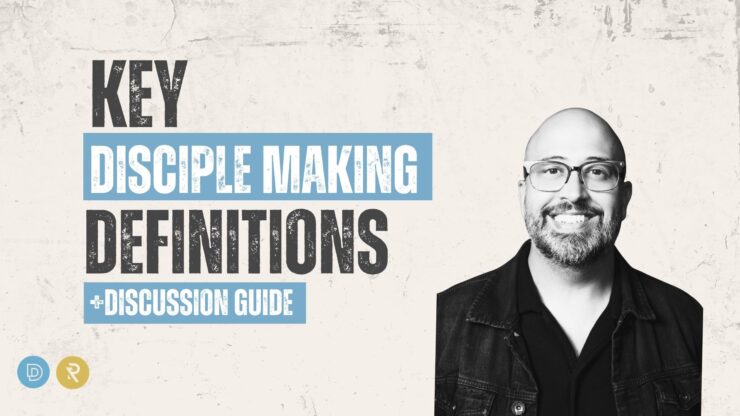Is Discipleship Required: 6 Steps for the Local Church (Pt.2)

Dear Discipleship-first Friends,
Last week we published a newsletter/blog that many people loved! And we loved that so many loved it. In case you missed it, the blog is entitled, Is Discipleship Required.
Curt wrote that article because he believes (and so does our whole team) that Jesus, the Apostles, and the other New Testament writers wrote specifically about being a disciple of Jesus in Scripture. Moreover, we hold that King Jesus theology is the best explanation for why being a disciple is mandatory. If you agree with us, then we feel it is only proper to follow up last week’s newsletter/blog with the best steps to implement this teaching in the life of your church. I recommend everything Curt writes about below… Bobby Harrington
- Don’t Announce the Revolution
We stole this line from our friend Bill Hull, the founder of the Bonhoeffer Project, who stole it from Dallas Willard. Whenever we first discover the importance of being and making disciples of Jesus, we have a tendency to get excited and share the news with everyone about how we are going to change everything in order to make disciples. However, our mistake comes when we fail to realize that not everyone else is processing the same information and emotions in the same way as us. The danger is that our attempt to be and make disciples comes off as another half-baked idea to do something new. It is better to start small and slowly acclimate the church to the idea.
However, if you have already announced the revolution, that doesn’t mean you can’t pull it off. It just means that you have placed yourself under scrutiny and you need to follow up convincingly on what you have proclaimed.
- Preach and Normalize “King Jesus”
Christ is one of those words in the New Testament that I believe is unfortunate that we transliterated instead of translating. As stated in the previous article, Jesus Christ would have been understood in the early church to mean “Jesus the Anointed King.” Re-read Paul’s letters and notice how often he refers to Jesus as Jesus Christ, Christ Jesus, or just Christ. Each time Paul wrote this, he was emphasizing Jesus’ kingship. Therefore, it is perfectly normal for us to refer to Jesus as King Jesus or Jesus the King.
If you are a pastor and preach topically, I would encourage you to preach a series about King Jesus and His Kingdom. If you preach exegetically, verse by verse through books of the Bible, I would encourage you to preach a series through the Gospel of Mark about how Jesus is announcing and implementing His Kingdom. Mark is a short book that is fairly quick to work through and I promise you the Kingdom is in there. Even when Jesus is not specifically preaching about His Kingdom or about being the Messiah (like when He is healing people), he is demonstrating that the Kingdom of God is about restoring creation and human beings to their original purpose under His rule. Such a series will help your church become accustomed to King Jesus and Kingdom language. It is also a great way to proclaim the good news of the Christ and the Kingdom of God.
The books I referenced in last week’s article, Why the Gospel by Matthew Bates and King Jesus and the Beauty of Obedience-Based Discipleship by David Young are good books to help you understand and explain King Jesus and His Kingdom to your people.
- Preach and Normalize Being a Disciple of Jesus
Again, if you preach topically, consider doing a study on the word disciple and how it is used in the New Testament. Begin with the first use of the word, Christian in Acts 11:26 and use the example I used in last week’s article to demonstrate that Christian was just Greek shorthand for a “disciple of Jesus.” However, if mentioning Taylor Swift and Swifties will not go over well in your church, you can use the example of the philosopher Epicurus and his disciples being referred to as Epicureans.
If you preach exegetically, you can point out the use of disciple in the book of Mark while you are teaching about the Kingdom of God. There are a couple of key points about disciples that you can emphasize in the book of Mark. In Mark 2:18 the author wrote about the disciples of John and the disciples of the Pharisees. This is a good place to point out that being a disciple of someone was a common concept in the first century and that everyone would have understood what it meant. You can insert the example from Acts 11:26 at this point to demonstrate that Christian simply meant “a disciple of Jesus.” It is also a good place to make the point that all churches, religions, and cultures are making disciples of someone or something. We need to make sure that we are specifically making disciples of Jesus.
The Discipleship Gospel by Hull and Sobels and the accompanying Workbook are good resources for tying being a disciple of Jesus to the gospel of King Jesus. Go through the workbook with church leadership or staff to get everyone on the same page.
- Preach and Normalize Conformity to the Image of Jesus as the Goal of Discipleship
So, how do we ensure that we are specifically making disciples of Jesus? The end result should be that people we are discipling act increasingly like Jesus. As I wrote in the article last week, I wrote a book with Discipleship.org on this subject because I don’t think it is emphasized enough. Recreated to Be like God: Making Disciples in the Image of Jesus ties being and making disciples to being recreated into the image of God through being conformed to the image of Jesus. There is a free short primer version that you can check out first and there is even a free audiobook version that you can download and listen to. You have my permission to plagiarize this book as much as you want—my only objective is to see people conformed to the image of Jesus.
When people understand that it is through imitating and obeying Jesus as His disciples that we fulfill our original purpose as the image of God, they will understand why discipleship is mandatory.
If you preach topically, you can just take the book and break it down into pieces to teach as a sermon series. However, I’ll admit that it might be difficult to preach this one exegetically verse by verse. Ephesians is probably the best book because the central passage and crescendo of Ephesians is:
You heard about Christ and were taught in him in accordance with the truth that is in Jesus. You were taught, with regard to your former way of life, to put off your old self, which is being corrupted by its deceitful desires; to be made new in the attitude of your minds; and to put on the new self, created to be like God in true righteousness and holiness. (Ephesians 4:21-24)
Ephesians 4:11 and 5:1 are important verses that make this point as well.
And always remember, what you celebrate, people will replicate. If you celebrate people being conformed to the image of Jesus, that is what your people will want to replicate.
- Make Your Small Groups Like AA
So here is the hard part that you were waiting for. Instead of looking and feeling like a classroom, small groups should look and feel more like AA.
To truly make disciples of Jesus, people need be loved and held accountable in a relational small group they can trust. Did you know that AA began as a Christian discipleship program? It was so successful at helping people change that a group of recovering alcoholics used the methodology to help other alcoholics get sober. They just dropped the Jesus part. Programs like Re:generation put Jesus back into the process. Likewise, Jim Putman modeled the small groups of Real Life Ministries after AA. You can learn their process from the Relational Discipleship Network.
There are other methods such as same-gender accountability groups, micro-groups, and one-on-one groups such as Small Circle. A quick Google search will reveal that there are many such groups out there. But whatever model you choose, it must hold people accountable for being conformed to the image of Jesus.
Again, don’t start with the whole church. If you are the lead minister/pastor, start with the elders or staff. Start with a group of people who have taken hold of the previous steps and want to know more. Start with just one group. Then, let the people who get it spark a flame that spreads throughout the church.
- Be Intentional
You want disciple making to grow organically, but at some point, you need to be organized and disciplined as well. Think about it like a garden or a grapevine. They grow organically, but they need to be watered, weeded, pruned, and controlled in order to produce the maximum amount of fruit. When you get this point, you can think about announcing the revolution. To help you be intentional, check out Brandon Guindon’s Intentional: Living Out the Eight Principles of Disciple Making.
For King Jesus,
Curt Erskine and the Discipleship.org Team
If you have enjoyed reading this, please consider joining our email list!











